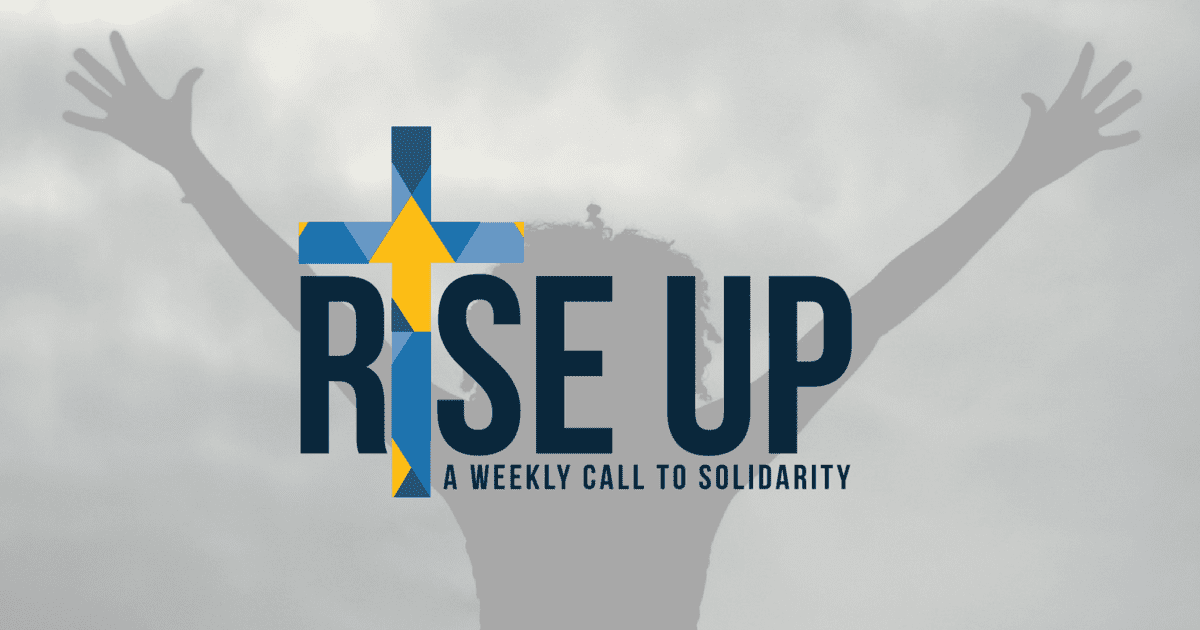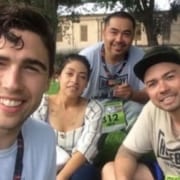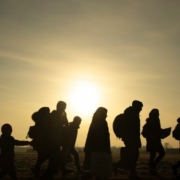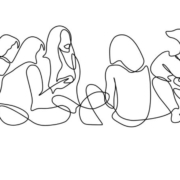Journeying as Shepherd in Troubled Times
BY CARLOS JIMÉNEZ | April 26, 2021
Sunday’s Readings

In this Sunday’s gospel reading, Jesus describes himself as a shepherd that looks after us, his beloved flock of sheep. While few of us encounter actual shepherds in our daily lives, what does this image mean for us? When have we found ourselves in need of love, care, and light? Or even still, when have we been able to guide and look after others in a similar manner?

Those of us who have the privilege of working with youth are familiar with the graces that this life-giving labor entails. Such is the importance of this ministry, that in 2019 the Society of Jesus added Journeying with Youth as one the Universal Apostolic Preferences, a pillar of the mission of Jesuit works across the world. Yet this vocation also comes with great responsibilities beyond the scope of our job descriptions. Whether we might be teachers, coaches, priests, mentors, or counselors, the youth often turn to us to help them make sense of the complex world we live in. And these are troubled times indeed. News of the suffering caused by the COVID-19 pandemic, the growing number of Black and other people of color killed by police brutality or the alarming rise of anti-Asian hate crimes across the country weighs heavily in our hearts. Amidst the pain, uncertainty, and confusion that can inevitably arise, we are called to be models of hope, discernment, solidarity, and action for the young people under our care.
None of these issues can be easily solved, which might leave us feeling powerless when confronting their magnitude and complexity. Yet one thing we must continuously do as people who journey with the youth, is to create spaces to engage them in courageous dialogue centered on listening to each other’s stories, developing a deeper understanding, and reimagining a more just and equitable society. Like Jesus is for us, we are called to be a guiding light amid the darkness for those on whose shoulders the healing and liberation of our country and the world rests.
How are you called to guide and look after others in these troubled times, to build a more just and equitable society?
Carlos Jiménez is the Director of Diversity, Equity & Inclusion at Bellarmine College Prep in San José. A graduate from Santa Clara University, where he obtained a B.S. in political science and a single subject teaching credential in social studies, Carlos has more than 13 years of experience providing support and advocacy for first-generation, low-income students and their families.









Education is such a valuable ministry, it truly provides countless opportunities to be “light” and “hope” to children and their families. As God shepherds me, I’ve been able to share carrying burdens for many children and their families. A gift for which I am and will be forever grateful!
When I taught a course in Adolescent Development for graduate students, I would often have a group of students who signed up together. This group was from the police department and took the course in order to understand themselves and the people they often worked with. It was a fun course as the awakening to our own mischievous past as well as finding better ways to serve others was their focus. The police department payed for the course and the better the person did in the course, the more the department paid. In my lecturing, I tried to establish in the class (mostly in their 30’s) a way of looking at those they were arresting in an encouraging and understanding way. At the beginning of the course, they thought of those they served as problems, not abiding by the law, just out to annoy and harm others. They reflected on the theories of others and realized they might not have the best solutions to their problems. They interviewed teenagers and went to schools for observations. Little by little they became different people filled with goodness and the ability to encourage those they arrested to be good. They told me about what their parents had said and agreed with their punishment and punitive ways but they did not. By the end of the course, several of the group decided to step out of the police force and go into teaching. They wanted to better the society in which they lived, they wanted to direct those they arrested to take part in a positive way of being with teens and young adults. Each year I was pleased to see the change in attitude and direction from one of negative encounter to positive direction to others. It was a struggle to get through the teaching program to participate in teaching. In looking in many classrooms they could see that the students wanted to bring goodness to the society in which they lived. They kept in contact and persevered. The ones that stayed in the police department also told about their change of attitude and a more satisfying participation in their career and home life. . We did not have a program to do this but the interactions they had with each other and a desire to improve those interactions made a difference. They believed that everyone created is part of the Body of Christ and need the love and care we are able to give.
I am the Good Shepherd – says the Lord.
I feel fear leads people to stay in the ruts rather than risk the unknown. I also believe older people too often believe they know best. (The know the fear best) “A child shall lead them.” We need to remind them that God is sovereign and we need to remind ourselves of this too! The old systems have not worked to break the sins of poverty, racism, and more.
Let’s move forward treating all equally. Let’s sacrifice our surplus for those suffering…
To move forward and to be all treated equally would need all races to be included and not excluded by a mentality that a particular race is solely responsible for all the problems relating to other cultures.
We are blinded by trying to make the world a better place and fighting on multiple fronts for so many injustice that MAY exist BUT we also at the same time starting to ignore key points that sabotage and slowly ruin things by finger pointing without admitting that every race is responsible for all injustice that happens.
Has for the youth today apart from certain aspects where peoples property got ruined and the supposedly peaceful protests I agree on a few things but not everything, we need the police regardless of what people think about them because community police will not work and would be corrupt.
But instead of false blame and witch hunting how about some realistic suggestions on how things can be fixed ?
Anyone can pass blame but it takes a real person to admit there faults.